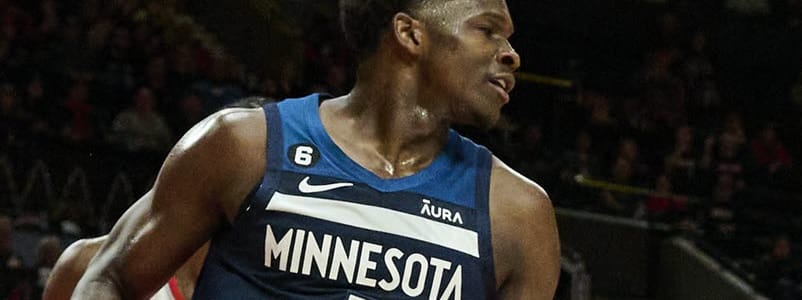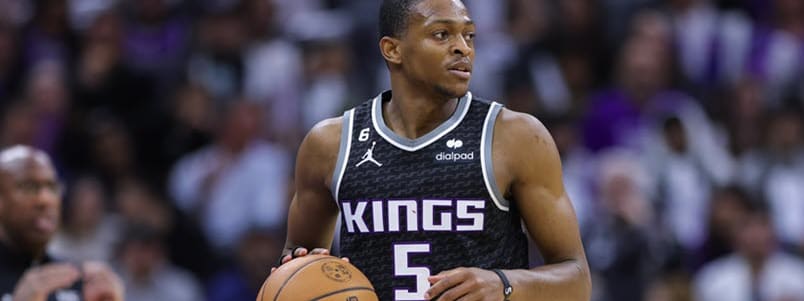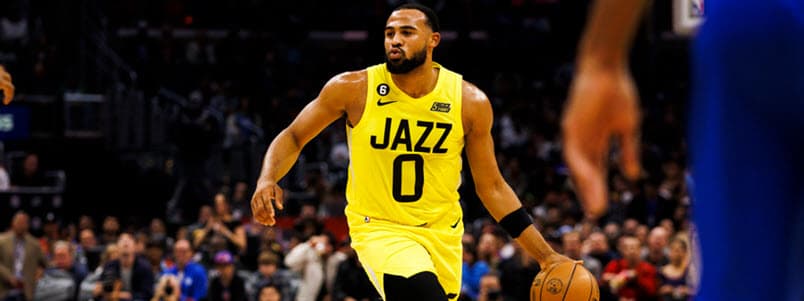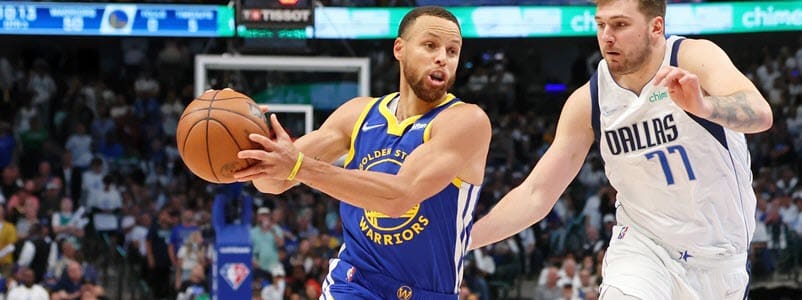Recent RotoWire Articles Featuring Austin Rivers
See More
Since the start of the 2018-19 campaign, Rivers has played for four teams and now finds himself in Minnesota. Fantasy production has never been a strong point for Rivers, and there is little reason to think that changes despite being on a new team once again. During the 2017-18 season, Rivers finished as the 139th ranked player while logging over 33 minutes per night. Given he is unlikely to see more than about 15 minutes per night for the Timberwolves, there is basically no chance he emerges as a viable target, even in deeper formats.
Last season was quite an up-and-down year for Rivers, as he first started the season with the Knicks and appeared in 21 games with the team. The Duke product averaged 7.3 points, 2.2 rebounds and 2.0 assists per game in 21.0 minutes in New York before being shipped off to the Thunder in part of a three-team trade. Rivers did not spend any time in OKC, however, as he was waived almost immediately after the trade was completed. The 6-foot-4 guard didn't have to wait too long as a free agent. Once Jamal Murray went down with his ACL injury, the Nuggets signed Rivers to a 10-day contract before eventually signing him for the rest of the season. As the injuries continued to mount for Denver, Rivers found himself in their starting rotation at the end of the season and throughout the playoffs. Including his postseason appearances, the 29-year-old guard averaged 8.9 points, 2.4 assists and 2.1 assists in 28.3 minutes per game while shooting 39.0 percent from beyond the arc with the Nuggets. With Murray still recovering from injury to start this season, Denver re-signed Rivers to a one-year contract this offseason. Despite not having Murray to start the year, the Nuggets' backcourt depth remains fairly strong. Monte Morris and Facundo Campazzo are still on the roster as well as a plethora of young guards such as Markus Howard, P.J. Dozier and Nah'Shon "Bones" Hyland. With a mostly healthy Nuggets roster, it would not be surprising if Rivers sees a decline in playing time this season due to the depth of the team. While the nine-year veteran provides a nice spark to the rotation due to his stellar defense and decent three-point shooting, it will be hard to imagine a major fantasy season out of Rivers in his 2021-22 campaign.
Rivers had a solid 2019-20 campaign with the Rockets, averaging 8.8 points, 2.6 rebounds, 1.7 assists and 1.4 threes across 23.4 minutes. He's decided to move on, however, inking a three-year, $10 million deal with the Knicks. In New York, he'll likely continue seeing minutes in the low-to-mid-20s, primarily as an off-the-bench scoring option. As a result, it's unlikely he'll provide much value in the fantasy arena.
Rivers was traded to Houston from Washington last season and played 47 games for the Rockets. Between the two teams, he averaged 8.7 points, 2.3 assists and 1.9 rebounds in 26.1 minutes per contest. He upped those numbers to 11.5 points, 4.0 assists and 3.0 rebounds in 15 starts. Rivers is occasionally good for a big scoring effort, but his production in other categories leaves much to be desired. He's a streaky shooter and not a particularly adept defender, limiting his overall fantasy value to deep leagues. He becomes even less valuable when considering the ultra-talented backcourt options available to the Rockets in James Harden, Russell Westbrook and Eric Gordon. Barring injury to those ahead of him on the depth chart, Rivers isn't worth a look in standard leagues.
Rivers struggled to stay healthy for portions of the 2017-18 season, most notably due to an Achilles injury that kept him out for 18 straight contests. However, when Rivers was on the court, he easily put together his most impressive effort since being drafted 10th overall in 2012. Rivers set career-highs in points (15.1), rebounds (2.4), assists (4.0), steals (1.2), three-pointers made (2.2) and minutes (33.7). Adding on to that, his efficiency didn't take much of a hit and Rivers still knocked down 42.4 percent of his field goal attempts and 37.8 percent of his three-pointers despite the added workload. A career 64.9 percent free-throw shooter, Rivers didn't show much improvement there with a 64.2 percent clip, but his advances elsewhere in his game made him a fairly attractive Fantasy option for much of the year. That said, the Clippers drafted a pair of guards in the first round of the 2018 NBA Draft and that created a logjam in the backcourt, resulting in Rivers being dealt to Washington this offseason. While the 26-year-old will join a playoff team, his path to playing time becomes much more difficult. The Wizards have All-Stars John Wall and Bradley Beal in the backcourt, so Rivers will have to return to a reserve role. That means his playing time is set to decrease fairly significantly, which in turn hurts his overall value. Look for Rivers to provide a scoring specialist off the bench, but his drop in minutes may take him off the radar for most standard leagues.
Rivers garnered a career-high 27.8 minutes per game last season, resulting in him setting career highs in nearly every statistical category. However, it was really a tale of two roles for him during the 2016-17 campaign – that of a reserve and that of a starter. When the Clippers were healthy, he took a reserve role to the likes of Chris Paul and J.J. Redick, posting 9.4 points and 2.1 assists across 23.4 minutes per game with a 51.8 true shooting percentage. But, as the Clippers dealt with a myriad of backcourt injuries, Rivers ended up drawing 29 starts, boosting his production up to 16.1 points and 3.8 assists across 34.5 minutes per game with a 57.2 true shooting percentage. Now, however, Chris Paul and J.J Redick are out of the picture and have been replaced by Patrick Beverley, Lou Williams and Milos Teodosic – a much weaker backcourt. As a result, Rivers could hover near the 27.8 minutes per game he saw last season, but would see it on a consistent game-to-game basis rather than it being an average of two separate roles. If that’s ultimately the case, Rivers’ Fantasy value should see a slight bump heading into the 2017-18 campaign.
While many consider the former lottery pick to be a disappointment after his first three NBA seasons, Rivers seems to have found a home as Chris Paul's backup in Los Angeles. After being traded last season from New Orleans to Boston and finally ending up in Los Angeles, the young point guard settled comfortably into a bench role under the guidance of his father and coach Doc Rivers. Rivers, who played in 76 games last season, rounded out the year by playing the final 41 games with the Clippers. During his stretch in LA, Rivers averaged 7.1 points, 2.0 rebounds, 1.7 assists, and 0.6 steals while shooting 43 percent in 19 minutes per game. Rivers brings little to the table in terms of fantasy value, as he posted just 3.4 rebounds and 3.7 assists per 36 minutes last season, and he should continue to see limited minutes as long as Paul remains healthy. On top of his issues with low playing time and poor adjusted statistics, Rivers has struggled mightily with efficiency over the last three years, shooting just 40 percent from the field and 62 percent from the free-throw line on his career. Beyond that, Rivers could see fewer minutes following the signing of veteran point guard Pablo Prigioni, who should add depth to an already crowded Los Angeles backcourt.
Rivers enters his third season in the NBA with a "bust" tag thanks to the former lottery picks' lackluster first two professional seasons, but the negativity surrounding Rivers may be a bit overstated. Last season, Doc Rivers' son averaged 7.7 points, 1.9 rebounds, 2.3 assists, and 0.7 steals in 19 minutes per game for the Pelicans. Rivers was also able to greatly improve his three-point shooting, hitting 36 three-pointers, and raising his accuracy nearly four full percentage points to 36 percent between his rookie and sophomore years. Free-throw shooting remains an issue for the combo guard, however, as he connected on just 64 percent of his attempts from the charity stripe. This may be the season that Rivers can finally make his mark on the league. Thanks to the departure of Brian Roberts to the Charlotte Hornets, there's an opening behind Jrue Holiday in the Pelicans rotation. Rookie Russ Smith and former Naismith College Player of the Year Jimmer Fredette will both make claims to that rotation spot, but Rivers holds the upper hand due to his familiarity with coach Monty Williams' playbook, not to mention his personal relationship with his head coach. Rivers isn't the best defender, but he has the ability to be the scorer off the bench that Williams lost when Roberts moved on.
Rivers had a rough season in 2012-13, averaging just 6.2 points with a PER* of 5.95. The combo guard missed the end of the season with a broken hand, but was a healthy participant for the Pelicans' summer league team. Rivers has reportedly improved this summer, but he will have stiff competition for backup guard minutes with Roberts, Morrow and Evans.
As the 10th overall pick, Rivers has known Monty Williams since he was a toddler and is primed to succeed in New Orleans. Rivers epitomizes a “combo guard.” At 6’4, 200lbs, he stands undersized to be a true shooting guard, but his score-first attitude goes against being a true point guard. While a starting point guard at Duke, Rivers averaged 15.5 ppg and 3.4 rpg but only accrued 2.1 apg. What Rivers has going for him is that he has only one point guard ahead of him on the roster.. Rivers will be a key contributor this year, though it remains to be seen where he will be used more. One thing that is for sure is that he will be able to score.













